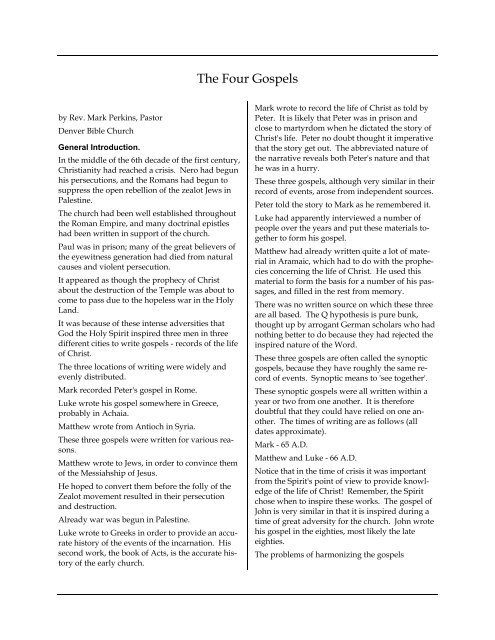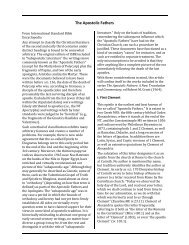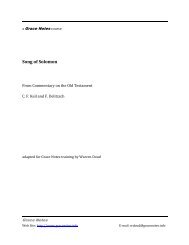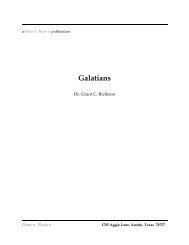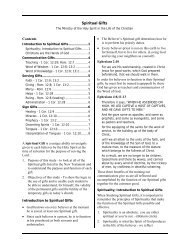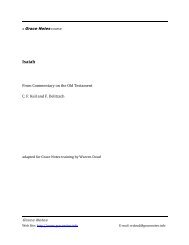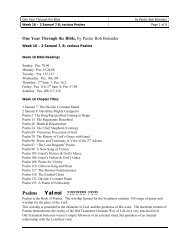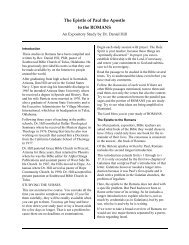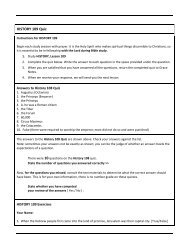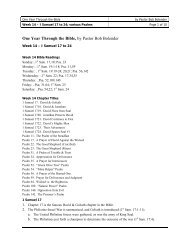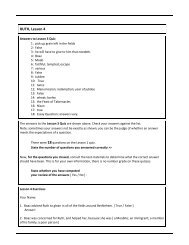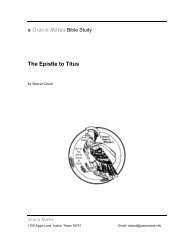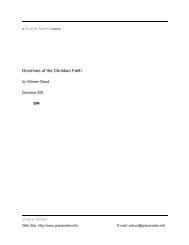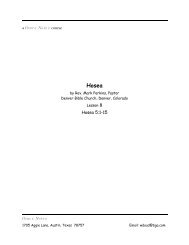The Four Gospels - Grace Notes
The Four Gospels - Grace Notes
The Four Gospels - Grace Notes
You also want an ePaper? Increase the reach of your titles
YUMPU automatically turns print PDFs into web optimized ePapers that Google loves.
<strong>The</strong> <strong>Four</strong> <strong>Gospels</strong><br />
by Rev. Mark Perkins, Pastor<br />
Denver Bible Church<br />
General Introduction.<br />
In the middle of the 6th decade of the first century,<br />
Christianity had reached a crisis. Nero had begun<br />
his persecutions, and the Romans had begun to<br />
suppress the open rebellion of the zealot Jews in<br />
Palestine.<br />
<strong>The</strong> church had been well established throughout<br />
the Roman Empire, and many doctrinal epistles<br />
had been written in support of the church.<br />
Paul was in prison; many of the great believers of<br />
the eyewitness generation had died from natural<br />
causes and violent persecution.<br />
It appeared as though the prophecy of Christ<br />
about the destruction of the Temple was about to<br />
come to pass due to the hopeless war in the Holy<br />
Land.<br />
It was because of these intense adversities that<br />
God the Holy Spirit inspired three men in three<br />
different cities to write gospels - records of the life<br />
of Christ.<br />
<strong>The</strong> three locations of writing were widely and<br />
evenly distributed.<br />
Mark recorded Peter's gospel in Rome.<br />
Luke wrote his gospel somewhere in Greece,<br />
probably in Achaia.<br />
Matthew wrote from Antioch in Syria.<br />
<strong>The</strong>se three gospels were written for various reasons.<br />
Matthew wrote to Jews, in order to convince them<br />
of the Messiahship of Jesus.<br />
He hoped to convert them before the folly of the<br />
Zealot movement resulted in their persecution<br />
and destruction.<br />
Already war was begun in Palestine.<br />
Luke wrote to Greeks in order to provide an accurate<br />
history of the events of the incarnation. His<br />
second work, the book of Acts, is the accurate history<br />
of the early church.<br />
Mark wrote to record the life of Christ as told by<br />
Peter. It is likely that Peter was in prison and<br />
close to martyrdom when he dictated the story of<br />
Christ's life. Peter no doubt thought it imperative<br />
that the story get out. <strong>The</strong> abbreviated nature of<br />
the narrative reveals both Peter's nature and that<br />
he was in a hurry.<br />
<strong>The</strong>se three gospels, although very similar in their<br />
record of events, arose from independent sources.<br />
Peter told the story to Mark as he remembered it.<br />
Luke had apparently interviewed a number of<br />
people over the years and put these materials together<br />
to form his gospel.<br />
Matthew had already written quite a lot of material<br />
in Aramaic, which had to do with the prophecies<br />
concerning the life of Christ. He used this<br />
material to form the basis for a number of his passages,<br />
and filled in the rest from memory.<br />
<strong>The</strong>re was no written source on which these three<br />
are all based. <strong>The</strong> Q hypothesis is pure bunk,<br />
thought up by arrogant German scholars who had<br />
nothing better to do because they had rejected the<br />
inspired nature of the Word.<br />
<strong>The</strong>se three gospels are often called the synoptic<br />
gospels, because they have roughly the same record<br />
of events. Synoptic means to 'see together'.<br />
<strong>The</strong>se synoptic gospels were all written within a<br />
year or two from one another. It is therefore<br />
doubtful that they could have relied on one another.<br />
<strong>The</strong> times of writing are as follows (all<br />
dates approximate).<br />
Mark - 65 A.D.<br />
Matthew and Luke - 66 A.D.<br />
Notice that in the time of crisis it was important<br />
from the Spirit's point of view to provide knowledge<br />
of the life of Christ! Remember, the Spirit<br />
chose when to inspire these works. <strong>The</strong> gospel of<br />
John is very similar in that it is inspired during a<br />
time of great adversity for the church. John wrote<br />
his gospel in the eighties, most likely the late<br />
eighties.<br />
<strong>The</strong> problems of harmonizing the gospels
<strong>Four</strong> <strong>Gospels</strong> 2<br />
Critics of the gospels have been very skeptical<br />
about the accuracy of the gospel accounts because<br />
even the synoptic gospels do not appear (at least<br />
on the surface) to harmonize well.<br />
However when the gospels are analyzed and then<br />
harmonized by those whose work goes beyond<br />
just a surface appraisal, things work out quite<br />
well. One such harmony is Dr. Thomas' A Harmony<br />
of the <strong>Gospels</strong>, which was written together<br />
with Dr. Gundry.<br />
Dr. Thomas lists the following as problems with<br />
harmonization on page 302 of his book.<br />
Accounts of Christ's words sometimes differ. One<br />
evangelist's report of the same conversation, saying,<br />
or discourse may be more less complete than<br />
another's. Differences may occur in grammatical<br />
construction. Synonyms may be substituted, verb<br />
voice or tense changed, or nouns replaced by pronouns.<br />
<strong>The</strong>re may be differences in the order of<br />
discussion.<br />
Sometimes the differences in details reported even<br />
involve what appear to be contradictions.<br />
Occasionally, the same or similar statements will<br />
be found in contexts which appear to reflect different<br />
situations.<br />
Somewhat similar events occur in different situations.<br />
Sometimes what really appears to be the same<br />
event will be reported in a different order in another<br />
gospel.<br />
Sometimes diverse descriptive details are given<br />
for what appears to be the same event; sometimes<br />
these details may have the appearance of discrepancy.<br />
<strong>The</strong> gospel writers do not always report the same<br />
events.<br />
<strong>The</strong> big issue is this: Do these problems undermine<br />
the historical integrity of the gospels? If they<br />
do, then they undermine the inspired nature of the<br />
word.<br />
In the last century, the German scholars saw these<br />
problems and failed to account for them. Instead,<br />
they arrogantly denied the inspired nature of the<br />
Word, and the ministers and the people followed.<br />
<strong>The</strong> result was two world wars, both started by a<br />
nation full of people who called themselves Christians.<br />
We stand on the brink of the same possibility<br />
in our own nation.<br />
Do not fear, however, for responsible scholarship<br />
more than accounts for these problems without<br />
compromising the historical integrity and inspired<br />
nature of these documents.<br />
<strong>The</strong> general solutions are as follows:<br />
Jesus spoke three languages: Greek, Hebrew, and<br />
Aramaic. <strong>The</strong> gospels were<br />
all written in Greek. <strong>The</strong>refore, by necessity many<br />
of the gospel accounts of Jesus' words are translations.<br />
In translation, there is plenty of room of<br />
variance without losing meaning.<br />
Sometimes the words are translated quite literally,<br />
but even so the use of synonyms is quite acceptable.<br />
Sometimes the words are translated more<br />
loosely in order to emphasize the impact of the<br />
words. This is also perfectly acceptable.<br />
In modern language we have many punctuation<br />
marks to indicate what is a direct quote and what<br />
is not; what is a clarification by the author, and<br />
what is a clarification by the original speaker;<br />
even footnotes are employed to refer to source<br />
materials. None of these things were available to<br />
the ancient writer.<br />
Because of this it is difficult to tell when the writer<br />
is doing one of these things in his translation of<br />
Jesus' words (even if he is translating). Suffice it to<br />
say that God the Holy Spirit is the supernatural<br />
director of all translations of Jesus' words, and He<br />
ensured their accuracy.<br />
When there are differences in translation, we can<br />
use them to amplify all the translations.<br />
Dr. Thomas summarizes this principle in this way:<br />
"What one does expect to be reproduced in ordinary<br />
discussion are the striking or important<br />
statements, the leading thoughts, the major divisions<br />
or topics, and the general drift of discussion<br />
including transitions from one topic to another.<br />
While different reports are expected to agree on<br />
these matters, it is also expected that there will be<br />
differences on details such as changes of person,<br />
substitution of pronouns for nouns or vice versa,<br />
changes in tense, voice, or mood of the verbs, and<br />
substitution of synonyms are too trivial to be<br />
taken as serious objections to a reporter's accuracy<br />
in ordinary discussion.
<strong>Four</strong> <strong>Gospels</strong> 3<br />
"While wording is important, meaning can be conveyed<br />
in a variety of ways. Verbal inspiration<br />
does not imply that truth can be accurately communicated<br />
in only one way. Rather, it means that<br />
the manner in which the Holy Spirit did speak<br />
through the human agents is inspired and hence<br />
accurate, word for word.".<br />
<strong>The</strong> people of the ancient world, especially the<br />
Jewish people, had highly trained memories.<br />
<strong>The</strong>y were often required to memorize long passages<br />
of the Old Testament, and even in a language<br />
that was not their native tongue.<br />
This, together with the ministry of the Holy Spirit<br />
led to tremendous accuracy with reference to the<br />
meaning of the translation.<br />
When a translation is direct from the Greek, we<br />
can expect greater accuracy in the quotation of<br />
Jesus' words, but even so, one writer for his own<br />
reason may add or subtract from the quotation<br />
without a violation of the principle of inspiration.<br />
Also, Christ no doubt repeated many of His words<br />
over the course of His ministry; this does not<br />
mean that He said the exact same thing every<br />
time. Even during the same sermon it is likely that<br />
He repeated Himself. One gospel writer may<br />
have recorded one part, while another different<br />
parts with slightly different wording.<br />
Differences in the details of what appear to be the<br />
same event may in fact be a record of two quite<br />
different occurrences.<br />
Sometimes, a writer will arrange his material according<br />
to subject and therefore take things out of<br />
chronological order. This too is acceptable, and<br />
does not corrupt the inspired nature of the text.<br />
<strong>The</strong> conclusion is this: that harmonizing the gospels<br />
presents no major problems with reference to<br />
inspiration. <strong>The</strong> accounts do harmonize well, and<br />
the problems that go with a harmony are easily<br />
and rationally accounted for.<br />
<strong>The</strong> Gospel of Matthew.<br />
For each gospel, we will follow this order:<br />
Author<br />
Circumstances of writing<br />
Target readership<br />
Purpose of writing, and<br />
Characteristics of the gospel.<br />
<strong>The</strong> Author<br />
Matthew - God used an outcast. His name is a<br />
transliteration of the Aramaic word which means<br />
"gift of God."<br />
In his own Gospel, Matthew uses his regular<br />
name. In other gospels, the name Levi is used. It<br />
is likely that Matthew became his name after his<br />
conversion.<br />
Matthew was a Jewish tax collector. It is likely<br />
that he was fairly well off financially because of<br />
his profession. This makes his decision to follow<br />
Christ all the more remarkable, because he left it<br />
all behind - Luke 5:28. It is likely that he worked<br />
at the toll house in Capernaum.<br />
When he decided to follow our Lord, he threw a<br />
big party, and invited all his friends. His decision<br />
to follow Christ was immediate.<br />
As a tax collector, Matthew was an outcast in Jewish<br />
society. He apparently had no friends who<br />
were devout in the Jewish faith for at his party<br />
there were only other tax collectors and sinners.<br />
<strong>The</strong> Roman tax collectors were hated by the Jews<br />
because the Roman taxes were in addition to the<br />
Jewish taxes.<br />
<strong>The</strong>y were also hated because they represented<br />
the occupying forces of the Roman Empire.<br />
<strong>The</strong> tax collectors made their living by inflating<br />
the Roman taxes. <strong>The</strong>y essentially worked on<br />
commission.<br />
Tax collectors were wealthy, but hated by their<br />
own society. <strong>The</strong>y had to live with a tremendous<br />
amount of prejudice.<br />
Because of this prejudice their social options were<br />
severely limited. <strong>The</strong>y could only socialize with<br />
others who were outcasts.<br />
It was easy for Matthew to follow Christ, considering<br />
his personal circumstances. Social isolation<br />
does not make it easy to enjoy personal wealth.<br />
No doubt he knew of the supernatural essence of<br />
Christ's ministry, and he may have even heard<br />
Him speak. It is often the outcast that finds it easiest<br />
to follow Christ.<br />
<strong>The</strong> Circumstances Surrounding the Writing of<br />
the Matthew
<strong>Four</strong> <strong>Gospels</strong> 4<br />
Of the circumstances of the writing of this gospel<br />
we know very little. What little we can draw<br />
comes from inside the book.<br />
<strong>The</strong> Target Readership for Matthew<br />
<strong>The</strong> target readership for Matthew's gospel was<br />
most likely Jewish believers in Palestine. A secondary<br />
audience may be found in Jewish audiences<br />
everywhere. His was the most read of all<br />
the gospels in the first century. This popularity is<br />
a good testimony to its arrangement.<br />
<strong>The</strong> Purpose of the Gospel of Matthew<br />
<strong>The</strong> purpose of this gospel was generally to<br />
awaken and establish faith in Jesus Christ.<br />
That this gospel was written primarily with a Jewish<br />
audience in mind brings a more specific purpose:<br />
To establish Christ as the Messiah and to<br />
answer the attacks of Jewish critics on the issue of<br />
the person of Christ.<br />
It was also intended as a tool for use in evangelism<br />
for other believers.<br />
Finally, it was probably intended as a last ditch<br />
effort to stem the tide of destruction which was<br />
descending upon the Jews in Palestine.<br />
<strong>The</strong> Jews were their own worst enemies. <strong>The</strong>y<br />
were extremely self-destructive, and especially so<br />
since their rejection of Christ as Messiah.<br />
<strong>The</strong>ir self-destructive tendencies culminated in a<br />
great number of them choosing the way of the<br />
zealot - armed resistance without virtue.<br />
<strong>The</strong> way of the zealot could only result in the destruction<br />
of the Jews in the land, and of Jerusalem.<br />
<strong>The</strong> Romans' method of warfare was far superior<br />
to that of the zealots. Anyone with common sense<br />
could see the inevitable destruction of the Jewish<br />
armies.<br />
<strong>The</strong>refore, Matthew wrote his gospel as a lastditch<br />
effort to stem the tide of destruction that had<br />
welled up among the Jews in Palestine.<br />
Matthew wrote just as the zealots began their<br />
armed revolt in 66 A.D.<br />
General Characteristics of Matthew<br />
<strong>The</strong> most striking of the characteristics of this gospel<br />
is its emphasis on Christ as the Messianic King<br />
promised by the Old Testament prophets. Time<br />
and again Matthew points out some event in<br />
Christ's life, or one of His characteristics as being a<br />
fulfillment of a prophecy. He especially concentrates<br />
on Christ as the fulfillment of the Davidic<br />
covenant.<br />
Matthew also concentrates on the kingdom of the<br />
Messianic king. He uses the term, "the kingdom<br />
of heaven" 32 times, but it is not mentioned elsewhere<br />
in Scripture. He stresses both the spiritual<br />
and political aspects of the kingdom. Matthew<br />
records ten parables about the kingdom which are<br />
found in none of the other gospels. His is the gospel<br />
of the New Covenant for Israel.<br />
Matthew's gospel has a very Jewish flavor, yet at<br />
the same time he often takes the opportunity to<br />
denounce the Pharisees and their incorrect practices<br />
and perceptions of the Messiah. <strong>The</strong> latter is<br />
probably due to Matthew's social isolation. No<br />
doubt he was often victimized by the Pharisees for<br />
being a tax collector. Like so many who are the<br />
victims of prejudice, Matthew has special insight<br />
into those who perpetuate such sins.<br />
However, Matthew does not exclude the Gentiles.<br />
Matthew was emotionally a Gentile because of his<br />
social isolation. He makes sure his readers understand<br />
that once the Jews have completely rejected<br />
Christ, the kingdom would be transferred to the<br />
Gentiles.<br />
Matthew is the one who arranges his material by<br />
subject, and aside from the passion week he does<br />
not follow the chronological order of events. Matthew,<br />
more than any other gospel writer, has an<br />
ax to grind. It is a righteous ax, and so he arranges<br />
his material to suit the grinding.<br />
In spite of Matthew's choice of arrangement, his<br />
gospel retains a great unity and order. This reveals<br />
the mind of a tax collector. <strong>The</strong> order of numbers<br />
and accounts lead naturally to literary order.<br />
<strong>The</strong>re is great continuity in the order of the subjects,<br />
and excellent literary transition.<br />
<strong>The</strong> Gospel of Mark.<br />
<strong>The</strong> Author(s) - Mark and Peter.<br />
<strong>The</strong>re are really two persons behind the writing of<br />
this gospel. <strong>The</strong> one who gave dictation, Peter,<br />
and the one who received it, Mark.<br />
<strong>The</strong> following is an extraordinary statement:<br />
Mark was there when both Paul and Peter died. It<br />
is extraordinary because Mark began life as a<br />
coward, and was for while in great disfavor
<strong>Four</strong> <strong>Gospels</strong> 5<br />
among the other disciples. This is a testimony to<br />
the grace of God.<br />
Mark was Jewish, and grew up in Jerusalem. No<br />
doubt he was aware of the person of Christ and<br />
the events of His life. <strong>The</strong>re is even some speculation<br />
that he was the young man of Mark 14:51-52.<br />
<strong>The</strong> actions of that young man are certainly commensurate<br />
with his character flaw of cowardice<br />
which he expressed about 20 years later.<br />
His mother's name was Mary, and he was a relative<br />
of Barnabas. When Paul and Barnabas took<br />
Mark along on the first journey, he left for home<br />
before their ascent of the Taurus mountain range<br />
on their way to the interior of Asia Minor, Acts<br />
13:5.<br />
This desertion set Paul's heart against Mark.<br />
When Barnabas and Paul decided on a later missionary<br />
journey, Paul refused to take Mark along<br />
on the basis of his former desertion, Acts 15:36-39.<br />
In fact, Paul and Barnabas had a sharp disagreement<br />
over the issue, and they parted ways at that<br />
point. Barnabas believed in Mark.<br />
Whatever transpired in the next 10 or 15 years<br />
(AD 49 to AD 62), Mark had won himself over to<br />
Paul. During Paul's first imprisonment, Mark was<br />
there with him, Col. 4:10; Philem 24. In Philemon<br />
(62 AD) Paul calls Mark a fellow worker. In Colossians,<br />
Paul reminds the Colossians to welcome<br />
Mark if he comes that way. Paul is restoring<br />
Mark's reputation to others.<br />
Mark was with Peter in Rome (called Babylon by<br />
Peter) 1 Pet. 5:13, and sent his greeting along with<br />
Peter's letter. Peter affectionately calls Mark his<br />
son.<br />
Mark apparently left Rome shortly after Peter's<br />
first epistle (@65 AD), because when Paul is imprisoned<br />
a second time at Rome, he calls for Mark,<br />
who is with Timothy at Ephesus, 2 Tim. 4:11. Paul<br />
calls Mark 'well useful for service'. He considers<br />
Mark the deacon type, and finds great favor with<br />
him in this role. <strong>The</strong> word for well useful is euchrestos,<br />
a very positive and complimentary<br />
word.<br />
If Mark obeyed Paul's command, and it is likely he<br />
did, then he was present when Paul was executed.<br />
If Mark was there for Paul's execution, then it is<br />
equally likely that he was there for Peter's, because<br />
they were both martyred at about the same<br />
time, and both in Rome.<br />
Mark watched the deaths of these two great believers.<br />
He faced death with courage this time, a<br />
changed man because of the truth residing in his<br />
soul. This is the man who ran at the arrest of Jesus,<br />
and who ran in the face of the unknown at the<br />
base of the Taurus mountains. Mark was a man<br />
who feared, and yet by the grace of God who<br />
grew, and then endured. It is extraordinary that<br />
he is the one chosen by God the Holy Spirit to put<br />
down in writing the gospel as told by Peter,<br />
probably just before or just after Peter's death.<br />
Remember Mark next time that you fail! And remember<br />
him the next time that you are ready to<br />
write someone off!<br />
Peter - Peter's name was also Simon. <strong>The</strong> testimony<br />
of Peter always stands behind the writing of<br />
Mark in this epistle.<br />
If there is one character trait of Peter which rises<br />
above all others, it is his emotionalism. Peter often<br />
let his emotions rule his thinking, much to his<br />
detriment and regret.<br />
Peter is enthusiastic, emotional, swift to speak<br />
without thinking, full of love and anger, sometimes<br />
legalistic and snobbish, and Jewish in a<br />
prejudicial way. He is one of the independent,<br />
rebellious Galileans. He loves Christ so much, yet<br />
he cannot muster the spiritual resources to remain<br />
with Him in His arrest, trial, and death.<br />
He is the second to the tomb on the third day, and<br />
enters first. He is the first of the disciples to see<br />
Christ after the resurrection. He is unsure of his<br />
standing with Christ immediately after the resurrection.<br />
Peter is a leader and very much a<br />
preacher, though not careful about what he says.<br />
He makes mistakes, he broods, and then he seeks<br />
and needs forgiveness in a desperate emotional<br />
way. In the end, he writes two epistles about suffering,<br />
and speaks his remembrances of Christ in a<br />
brief, but humble manner.<br />
<strong>The</strong> gospel includes those incidents which place<br />
Peter in an unflattering light. In these he is brutally<br />
honest about his mistakes.<br />
It excludes those incidents which place Peter in a<br />
flattering light.
<strong>Four</strong> <strong>Gospels</strong> 6<br />
Peter is an early leader in the church, but fades<br />
from the limelight in about 50 AD Nothing is<br />
heard from him until he writes his epistles in the<br />
early 60's, and then dictates his gospel story to<br />
Mark in the mid-60's.<br />
Probably the best analogy to Peter's early character<br />
is a politician on the campaign trail. Always<br />
promising, always in the limelight, but never following<br />
through.<br />
Circumstances Surrounding the Writing of Mark<br />
<strong>The</strong> place is Rome, the situation the persecutions<br />
of Nero. Paul and Peter are in prison, soon to die<br />
at the command of Nero himself.<br />
Mark is there with them. Peter is anxious to tell<br />
the story of Christ before he dies, and he does so,<br />
dictating to Mark.<br />
It is not clear whether Mark actually composed<br />
this gospel before or after Peter's death. It is not<br />
important. This was a really hard time for believers<br />
in Jesus Christ, and especially so in Rome.<br />
<strong>The</strong> Intended Readers of Mark's gospel.<br />
It is most likely that Peter (and Mark) had a Gentile<br />
audience in mind. This is especially interesting<br />
since Peter began with a prejudice against the<br />
Gentiles, and one which was difficult for him to<br />
leave behind. It apparently took him more than 20<br />
years to do so. His gospel is devoid of anything<br />
that would be offensive to a Gentile, and it does<br />
not presuppose an extensive knowledge of the<br />
Old Testament.<br />
Also, the Roman audience would have taken priority,<br />
since it was the closest.<br />
<strong>The</strong> purpose of the Gospel of Mark<br />
Mark was written to win converts to Christianity.<br />
Mark portrays Christ as a suffering servant. This<br />
image fits well the Christians in Rome, and so the<br />
Romans would have been well acquainted with it.<br />
To encourage those in Rome who were enduring<br />
persecution. Peter always had a heart for those<br />
who were suffering. He mentions the persecution<br />
of Christ often to encourage those who endured<br />
similar sufferings.<br />
<strong>The</strong> greatest testimony and greatest encouragement<br />
for those who suffer is that of Christ.<br />
<strong>The</strong> greatest testimony for those who are in unbelief<br />
is the suffering of Christ.<br />
Remember, this gospel goes out to the very hotbed<br />
of the Neronian persecution. It is a voice that rises<br />
above the cacophony of persecution and says, "but<br />
it is true".<br />
Characteristics of Mark's Gospel<br />
Brevity - it is easily the shortest of the gospels, and<br />
conspicuous among the missing are the nativity,<br />
the genealogy, and most of Christ's longer discourses.<br />
Action - Peter tells the story as he lived his own<br />
life. <strong>The</strong> story moves at a very fast pace, and its<br />
transitions force the narrative into a bang-bang<br />
story. <strong>The</strong> crowds are always pressing, the demons<br />
always<br />
attacking, miracles constantly being performed.<br />
Peter includes action and excludes doctrine. Mark<br />
has been called the camera man of the gospel writers<br />
for his vivid portrayal of the life of Christ.<br />
Believability - the story is told in simple and even<br />
rough language. Peter's Greek lacks perfection,<br />
but it gives the gospel a nice 'I was there' touch<br />
that makes it quite vivid and easy to believe.<br />
Many minor details are included about Christ and<br />
His person. Even the bad things are left in the<br />
story.<br />
Centered on Christ as the Son of God and as the<br />
servant of man. This would have been a good<br />
combination for his Gentile audience. <strong>The</strong> distinction<br />
of servanthood would have been especially<br />
appropriate since their Gods were ones who demanded<br />
service instead of those who would give<br />
it. <strong>The</strong> contrast would be striking.<br />
Chronological - Apparently, Mark's gospel follows<br />
closely the actual chronological order of events in<br />
the life of Christ.<br />
<strong>The</strong> Gospel of Luke.<br />
<strong>The</strong> Author - Luke<br />
God used a Gentile doctor. Luke is mentioned<br />
only three times in all of the New Testament, yet<br />
he is responsible for 28% of it, for he wrote both<br />
his gospel and the book of Acts.<br />
Luke is the only Gentile writer of the New Testament,<br />
and probably the only second-generation<br />
Christian writer. He was not present at the incarnation.
<strong>Four</strong> <strong>Gospels</strong> 7<br />
Luke is most likely Greek. He is an excellent<br />
writer and historian. In fact, he is the greatest of<br />
the historians of antiquity. He is objective, detailed,<br />
and well-informed. He writes clearly and<br />
keeps things very well ordered.<br />
Paul calls Luke the beloved physician in Colossians<br />
4:14.<br />
Although there were many charlatans in the ancient<br />
world, there were also a number of good and<br />
skilled physicians.<br />
Medicine did not go much beyond advanced first<br />
aid in the ancient world, but such a service was<br />
very valuable.<br />
Luke was probably behind Paul’s advice for Timothy<br />
to take a little wine for his stomach.<br />
At one point, Luke was the only one with Paul<br />
during his imprisonment, 2 Tim 4:11.<br />
Luke would have been a valuable addition to a<br />
missionary team, considering the hazards of travel<br />
in the ancient world. Considering the number of<br />
times that Christians were beaten, stoned, or otherwise<br />
injured because of their faith, Luke got to<br />
practice his profession often.<br />
Luke was not only the team physician, but he was<br />
often active in the evangelistic efforts, Acts 16:13.<br />
That Luke was a Gentile meant that he would<br />
have been valuable in ministering to other Gentiles.<br />
Remember, most of the missionary teams<br />
were Jewish, and Paul's ministry at first concentrated<br />
on teaching at synagogues.<br />
Circumstances and Target Readership.<br />
Luke wrote in about 66-67 AD He wrote his gospel,<br />
and later the Acts of the Apostles, to a man by<br />
the name of <strong>The</strong>ophilus. He probably wrote from<br />
somewhere in Greece, maybe even Athens. Little<br />
else is known about the circumstances of writing.<br />
Luke addresses <strong>The</strong>ophilus as "most excellent".<br />
This title was often used of those who were in<br />
prominent social or political positions. <strong>The</strong>ophilus<br />
was likely such a man. By accepting a book<br />
dedicated to him, <strong>The</strong>ophilus would have followed<br />
the ancient tradition of taking responsibility<br />
for its publication. We owe our thanks to<br />
<strong>The</strong>ophilus for the preservation of this great gospel.<br />
Luke wanted to produce a gospel for Gentile<br />
readers, and it is easy on the Hebraisms and explains<br />
Jewish customs and localities. He usually<br />
quotes the Old Testament when it is contained in a<br />
saying of Christ, but not otherwise. <strong>The</strong>re is little<br />
emphasis on the fulfillment of prophecy.<br />
Purpose of the Gospel of Luke<br />
Luke comes right out and says it in chapter 1:4:<br />
"so that you might know the exact truth about the<br />
things you have been taught."<br />
It is Luke's intent to be precise, and to more fully<br />
explain the subjects of which he has already spoken.<br />
Verses 1-3 in the first chapter reveal Luke's motive<br />
and method: "Inasmuch as many have undertaken<br />
to compile an account of the things accomplished<br />
among us, just as those who from the beginning<br />
were eyewitnesses and servants of the<br />
word have handed them down to us, it seemed<br />
fitting for me as well, having investigated everything<br />
carefully from the beginning, to write it our<br />
for you in consecutive order, most excellent <strong>The</strong>ophilus,"<br />
Luke wrote for <strong>The</strong>ophilus, but with the intent<br />
that <strong>The</strong>ophilus would publish this work, and<br />
pass it along to many others. Luke's purpose is<br />
broad in its scope.<br />
It is apparent that there were many falsehoods<br />
and distortions going around about the person<br />
and life of Christ. Luke wants to set the record<br />
strait with an exact narrative of the events.<br />
Of course, by getting the record straight, Luke's<br />
desire is for evangelism. He wants people to know<br />
the truth, and to identify Christ as their savior.<br />
Luke has a great emphasis on the cross, and the<br />
end of the life of Christ. This reveals his designs<br />
for evangelism.<br />
Characteristics of Luke's Gospel<br />
Luke's gospel is much more comprehensive than<br />
the others. It begins many months before the<br />
other synoptic gospels, and it ends after the ascension.<br />
Many details are included here which are not<br />
in the others. Luke is a diligent and thorough historian.<br />
Luke concentrates on praise and worship more so<br />
than the other gospels. He records the four great<br />
nativity songs - Mary's, Zacharias', that of the angels,<br />
and Simeon's.
<strong>Four</strong> <strong>Gospels</strong> 8<br />
Luke emphasizes the humanity of Christ, and the<br />
perfection of that humanity.<br />
Luke stresses that Christ makes salvation available<br />
to all men, and not just to Jews. He clearly shows<br />
the impact of Christ on the lives of many men,<br />
women, and children. Both the rich and poor, the<br />
Jew, the Samaritan, and the Gentile are included.<br />
Luke often shows this impact as occurring right<br />
inside people's homes.<br />
Luke records seven prayers of Jesus Christ which<br />
are not mentioned elsewhere.<br />
Luke is literary. He has a remarkably large vocabulary,<br />
and uses many different writing styles<br />
to fit the situation at hand. His is the best written<br />
of the gospels from a literary standpoint. <strong>The</strong>re<br />
are 800 words in Luke and Acts which do not occur<br />
elsewhere in the New Testament.<br />
Luke is detailed, but not to the point of boring his<br />
readers to death. He has a knack for including<br />
what is pertinent to the narrative, and leaving behind<br />
what is extraneous. Perhaps the powers of<br />
observation and diagnosis he developed as a doctor<br />
come into play in this regard.<br />
Luke concentrates on the death of Christ. From<br />
chapter 9 forward he keeps the thread of Christ's<br />
death in the fabric of his narrative.<br />
<strong>The</strong> Gospel of John<br />
<strong>The</strong> Author - John<br />
God used a zealot. He was a cousin "according to<br />
the flesh" of Jesus Christ. Brother of James (not<br />
the epistle writer). A native of Galilee. John's<br />
mother Salome was a follower of Jesus, and ministered<br />
to Him of her own means.<br />
John was a fisherman of the Sea of Galilee, his life<br />
was hard work, but apparently it had paid off for<br />
his family, because they had servants, and were<br />
able to support the ministry of Jesus Christ. Galilee<br />
was a region somewhat analogous to the U.S.<br />
South not too long ago. It is conservative to a<br />
fault, and more than a little rebellious in character.<br />
<strong>The</strong> fires of rebellion flamed openly in this region.<br />
In reality a lot of senseless violence took place in<br />
the name of the zealot movement, but there was<br />
very little virtue. This time was somewhat analogous<br />
to that of Northern Ireland today.<br />
John had great humility. When John the Baptist<br />
points out Jesus as the Messiah, John follows withwithout<br />
delay. He never mentions own name in<br />
own Gospel.<br />
He was nicknamed, with brother James as the<br />
"Sons of Thunder", a reference to their manner in<br />
Word and Deed, Mk 3:17. It is likely that they had<br />
a fair amount of Zealot ideals in their heads.<br />
He was outspoken about his faith from the start.<br />
He was "<strong>The</strong> disciple whom Jesus loved" - was the<br />
closest to Jesus of the inner circle of Peter, James,<br />
and John.<br />
He was the only eyewitness to the cross among<br />
the disciples, and he was eyewitness to the resurrection,<br />
Jn 20.<br />
He was one of the "Pillars of the Church", Gal 2:9.<br />
Paul had a high regard for him. He took over as<br />
chief of Apostles some time in the late 70's.<br />
His writing reflects the 50+ years of careful<br />
thought about the life of Christ and the Christian<br />
life.<br />
Under his ministry, Ephesus became the center of<br />
the pivot which gave the Roman Empire its greatest<br />
time of prosperity under the Antonine Caesars,<br />
98-180 AD<br />
He used very basic Greek grammar to express incredibly<br />
deep theological ideas.<br />
He was the key figure in the transition from the<br />
pre-canon period to the post canon period.<br />
Circumstances of Writing the Gospel.<br />
John wrote about 20 years after the completion of<br />
the synoptic gospels.<br />
<strong>The</strong> synoptic gospels were written during the<br />
Neronian persecutions; John's gospel is written in<br />
the aftermath. <strong>The</strong> Neronian persecution set the<br />
attitude in the Roman Empire. <strong>The</strong> average Roman<br />
at least publicly viewed Christianity and<br />
Christians with disdain.<br />
This unpopularity was worse for Christianity than<br />
the original persecution. Peer pressure was more<br />
effective in weakening Christianity than capital<br />
punishment. Martyrs make good PR figures.<br />
At the time of writing, Christianity was much<br />
weaker than it had been some twenty years before.<br />
John probably wrote from Ephesus, the place of<br />
his later ministry. He had formerly ministered in
<strong>Four</strong> <strong>Gospels</strong> 9<br />
Jerusalem, but was apparently driven out by Jewish<br />
persecution.<br />
John was the last eyewitness to the life of Christ,<br />
and he has a desire to retell the story in his own<br />
words.<br />
John wrote in a time of transition to the postcanon<br />
era of the church age. <strong>The</strong> temporary spiritual<br />
gifts, with all their fantastic abilities, are being<br />
left behind.<br />
<strong>The</strong> Target Audience<br />
If John's Epistles are any indication of the readers<br />
of his gospel, he wrote to a crowd that needed to<br />
understand the basics of Christianity.<br />
<strong>The</strong> Christian church had fallen into great disrepair<br />
in just twenty years' time. <strong>The</strong> average Christian<br />
did not understand even how to confess his or<br />
her sins.<br />
<strong>The</strong> suffering of the Neronian persecution, and the<br />
relentless peer pressure of the pagan Roman citizens<br />
had led many believers to seek alternate philosophies<br />
which bore the name of Christianity, but<br />
which were anything but.<br />
John has an very tough uphill battle to fight with<br />
regard to heresy and the truth. <strong>The</strong> situation was<br />
not unlike what we encounter in our nation today.<br />
<strong>The</strong> Purpose of the Gospel<br />
In John 20:30-31, John communicates his purpose:<br />
"Many other signs therefore did Jesus in the presence<br />
of the disciples, which are not written in this<br />
book: but these are written, that you may believe<br />
that Jesus is the Christ, the Son of God; and that<br />
believing you may have life in his name."<br />
John wants his readers to believe if they are unbelievers,<br />
and to grow to maturity if they are believers.<br />
In order to do so, he attempts to establish Jesus as<br />
the Son of God and the Messiah (Christ), and reestablish<br />
the Word of God as the authority and the<br />
Truth.<br />
<strong>The</strong> Characteristics of the Gospel.<br />
<strong>The</strong> gospel is very simple in the use of the Greek<br />
language and writing style.<br />
John writes about some extremely profound concepts,<br />
and he uses many symbols to do so.<br />
John records at least six miracles which are recorded<br />
nowhere else in the gospels. He always<br />
designates these as signs.<br />
John's gospel concentrates on events which are not<br />
recorded elsewhere. He records Christ's early<br />
Galilean ministry, and his upper room discourse.<br />
John concentrates on the words of Christ Himself.<br />
John develops in a fair amount of detail the relationship<br />
between the Father and the Son.<br />
John's gospel is like a commentary - he inserts his<br />
comments on the narrative many times - interpreting<br />
and illuminating the events as they occur.<br />
<strong>Grace</strong> <strong>Notes</strong> is a ministry of Austin Bible Church,<br />
Austin, Texas<br />
http://www.austinbiblechurch.com<br />
For an index of topics, or information about regular<br />
Bible studies, write to:<br />
Warren Doud<br />
<strong>Grace</strong> <strong>Notes</strong><br />
1705 Aggie Lane<br />
Austin, Texas 78757<br />
E-Mail: wdoud@gracenotes.info<br />
URL: http://www.gracenotes.info<br />
<strong>The</strong>re is no charge for <strong>Grace</strong> <strong>Notes</strong> materials. <strong>The</strong><br />
work is supported by Christians who pray for the<br />
ministry and share in the expenses.


